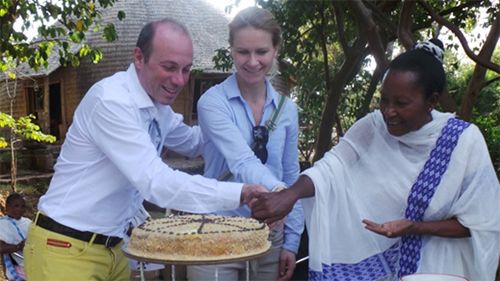
Blog post -
Africa’s coffee queen
Travelling is an important part of our job. We spend around 150 days a year visiting coffee farmers around the world. Long-standing and close relations ensure quality and positive development. This time, Therese went to Ethiopia on a journey where she got to meet one of Africa’s coffee queens.
***
Travelling in southwest Ethiopia is an incredible experience, stunningly beautiful country mixed with wonderful chaos, cheerful and nice people and, above all, a sense that there is great potential for an improved coffee production. Representing Löfbergs Foundation, I am in Ethiopia to start a development project for smallholder coffee farmers together with our friends from Lavazza Foundation and Hanns R. Neumann Stiftung. We aim to support approximately 1,000 coffee farming households during the first two years, and then increase to 2,500 beneficiaries. This is an amazingly ambitious project with many obstacles, but with great potential in the end.
Coffee is important to Ethiopia; approximately 60 per cent of foreign income comes from coffee. That is one of the reasons that our visit includes a meeting with the Ethiopian Prime Minister, who expresses grand plans on how to become the world's second largest producer of coffee - a very ambitious goal that shows how proud they are of their country’s coffee history and its relevance for people’s living conditions.
Quality assurance on a bean level
Our trip in Addis Ababa begins with a kick-off meeting for a development project, where we will help smallholder coffee farmers to increase their productivity in a sustainable manner. We are 2,600 metres above sea level and we travel down the hills of Addis on our way to the meeting. Once we get there, we see a large gathering of women who come to work; they will sort coffee beans by hand in the building next to us. Imagine that each bean from Ethiopia is checked by hand before packing! They hold firmly to this tradition as it provides jobs for a large number of women.
At the kick-off meeting, we go through our objectives and choose a name for the project: Coffee Alliance For Ethiopia (CAFE). We expect the project to do good in many ways. We hope to improve productivity, food security, gender equity and the capacity to adapt to climate changes.
One big challenge is the current condition of the farms. Many trees are very old and have a biennial cycle, which means that the production is extremely low every other year. We believe that it should be possible to at least double the production in five years, e.g. through gradual rejuvenation programs and the adoption of soil water/nutrient conservation practices such as rain water harvesting, mulching, composting and cover crops.
Rainfalls alter the route
Later on, we drive about 6 hours south of Addis. During our journey, we get a glimpse of how people live in the countryside as well as in some towns and villages that we pass through. It is easy to understand that the population of Ethiopia is more than 90 million as we see people everywhere along the roads. The 6-hour ride becomes at least an 8-hour ride before we finally reach Awasa where we stay the night. We are now in the Amaro district, a part of the Sidamo province.
As heavy rainfalls have washed away the roads up the mountain, we are not able to reach the coffee farmers as planned. Instead, we meet at the Aregash Lodge. Here we get to see flowers, coffee, fruit and vegetable plantations as well as beautiful surroundings with monkeys and many different birds. The coffee farmers who come down from their plantations have travelled 12 hours to meet us, 150 kilometres away from their farms.
We finally get to meet the farmers and their families, including some from the younger generations that are about to take over their family farms. None of them know English, so we have to use an interpreter. Most of the farmers speak a small local language (100 different languages are spoken in Ethiopia!) and we have to translate in two rounds. Luckily, we manage to understand each other.
A true pioneer
To build trust and faith for the development project amongst the farmers we need local ambassadors. One of the key persons is a woman called Mrs. Asnakech Thomas. She owns Amaro Gayo Coffee, a pioneer organization in the development of coffee production in Amaro.
The more I get to know Mrs Thomas, the more impressed I get. She is a strong, energetic, innovative and well-respected woman, who fled to the UK when she was 14 years old and lived there for many years before she felt the urge to come back to Amaro.
Since 2007, she has managed to support 431 farming households in the marketing of their coffee as well as with providing seedlings and materials for the establishment of drying beds for quality enhancements. This has resulted in almost three times improved prices for their coffee so far.
While we are in Amaro, Mrs Thomas gets some good news. She has received an export certificate for one of her latest ideas: to make tea out of coffee leaves. She is so happy when she tells us this means the tea will be sold to Germany this spring! She pours a cup of the coffee flavoured tea for us to enjoy– and it is delicious! Perhaps we should sell it in Sweden as well?
// Therese Gustafsson
